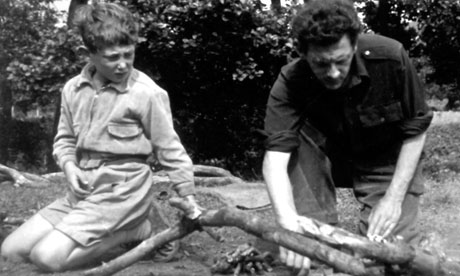As a boy, Michael Rosen used to sit spellbound on holiday while his father read from Dickens and brought Pip, Miss Havisham and Magwitch vividly to life. Fifty years on, the tale still resonates as it merges with his own family's journey out of poverty in London's East End

Michael Rosen with his father, Harold, on a family camping holiday. Photograph: Courtesy Of Brian Rosen/Rosen Family Archive
We are on holiday on the coast of Yorkshire, not far from Whitby. It's a campsite and there are two families with a couple of friends added in.
It is 1959 and I'm 13. Just as it's getting dark we are called to the biggest tent where my father is pumping up the tilley lamp, a large green light that works by burning paraffin under pressure in a "mantle" – a white cylinder of cloth that sits at the top of a tube. He loves faffing about doing this, and that's what he calls it when he pretends it's bothersome. "It's a bit of a faff," he says, while adoring the way that it's his expertise with the paraffin can, the funnel and the little brass handle that delivers this hard, white light.
So we sit ourselves down on sleeping bags, blankets and cushions. The tilley lamp sits on a fold-up wooden chair, my father sits on another in the middle of us. Looking round the tent, I can only see our faces catching the light, as if we are just masks hanging there, our bodies left outside in the dark perhaps. In my father's hands is a book – Great Expectations – and every night, there in the tent, he reads it to us. Without any hesitation, backtracking or explanation he reads Pip's story in the voice of the secondary-school teacher he is, but each and every character is given a flavour – some more than others: Magwitch, of course, allows him to do his native cockney.
Thinking about it now, I can see that his Jaggers was probably based on a suburban headteacher from one of the schools he taught in; Uncle Pumblechook could have been derived from the strangely pompous shopkeepers and publicans who peopled the hardware stores and cafes of outer London, where we lived in the 1950s. But over the years, as my father tells us about his own upbringing, some of Dickens' characters start to mix and merge with our own relatives.
Full story at The Guardian.
It is 1959 and I'm 13. Just as it's getting dark we are called to the biggest tent where my father is pumping up the tilley lamp, a large green light that works by burning paraffin under pressure in a "mantle" – a white cylinder of cloth that sits at the top of a tube. He loves faffing about doing this, and that's what he calls it when he pretends it's bothersome. "It's a bit of a faff," he says, while adoring the way that it's his expertise with the paraffin can, the funnel and the little brass handle that delivers this hard, white light.
So we sit ourselves down on sleeping bags, blankets and cushions. The tilley lamp sits on a fold-up wooden chair, my father sits on another in the middle of us. Looking round the tent, I can only see our faces catching the light, as if we are just masks hanging there, our bodies left outside in the dark perhaps. In my father's hands is a book – Great Expectations – and every night, there in the tent, he reads it to us. Without any hesitation, backtracking or explanation he reads Pip's story in the voice of the secondary-school teacher he is, but each and every character is given a flavour – some more than others: Magwitch, of course, allows him to do his native cockney.
Thinking about it now, I can see that his Jaggers was probably based on a suburban headteacher from one of the schools he taught in; Uncle Pumblechook could have been derived from the strangely pompous shopkeepers and publicans who peopled the hardware stores and cafes of outer London, where we lived in the 1950s. But over the years, as my father tells us about his own upbringing, some of Dickens' characters start to mix and merge with our own relatives.
Full story at The Guardian.
No comments:
Post a Comment